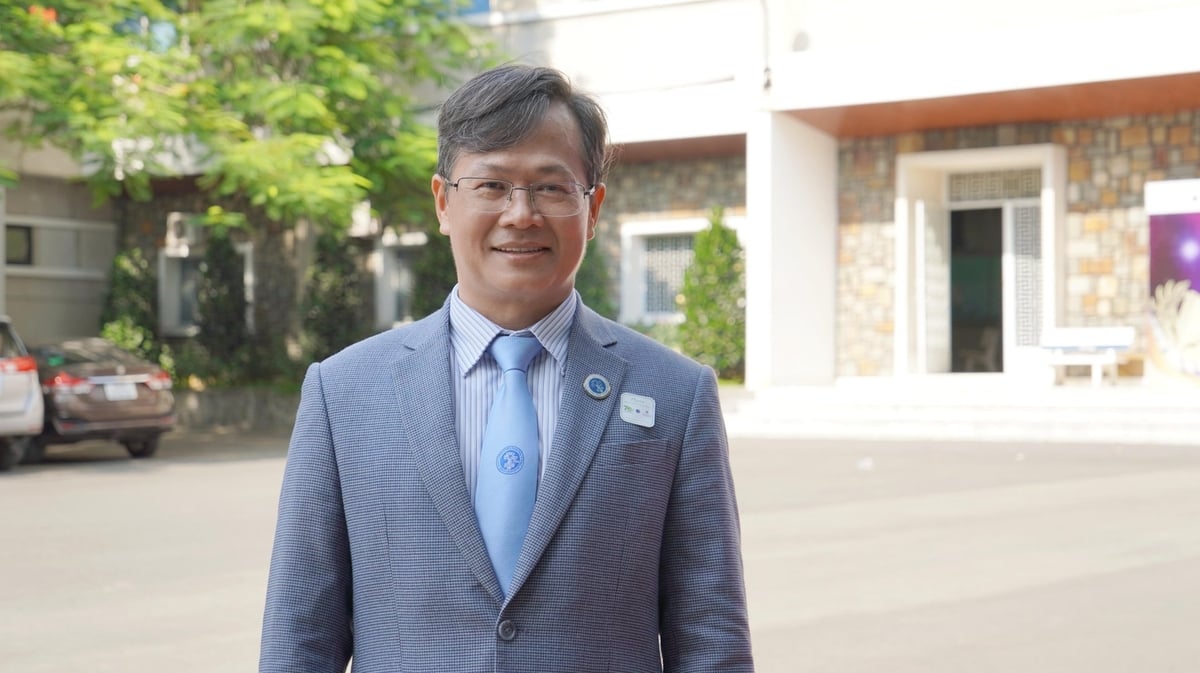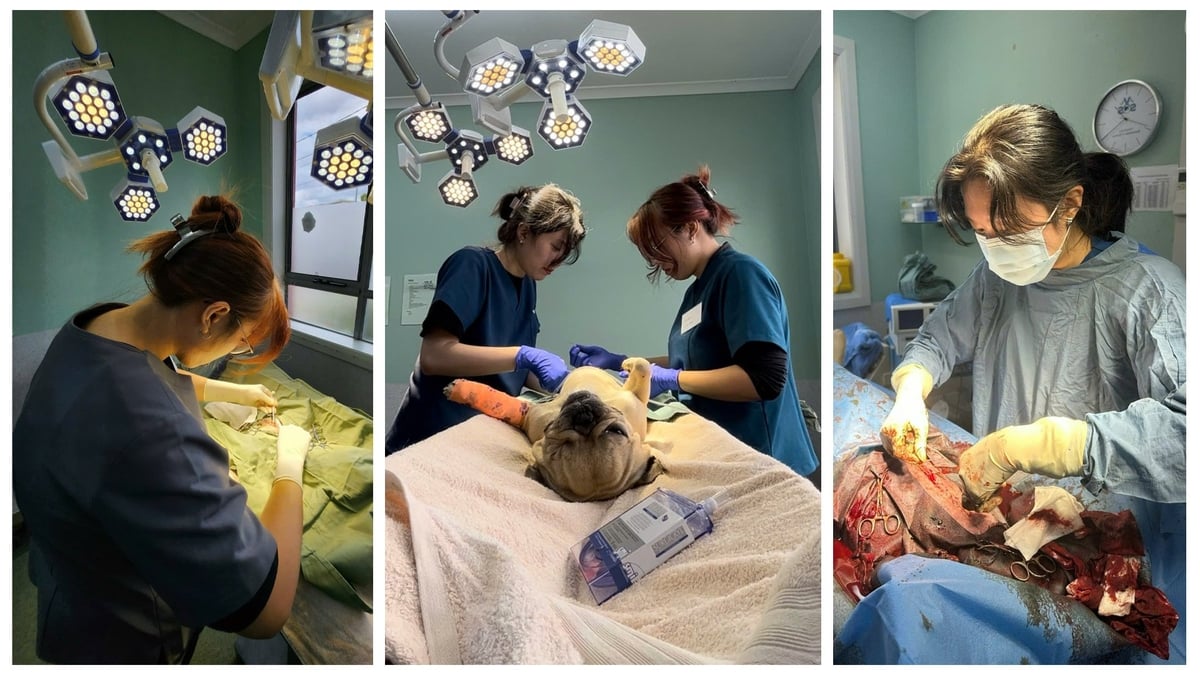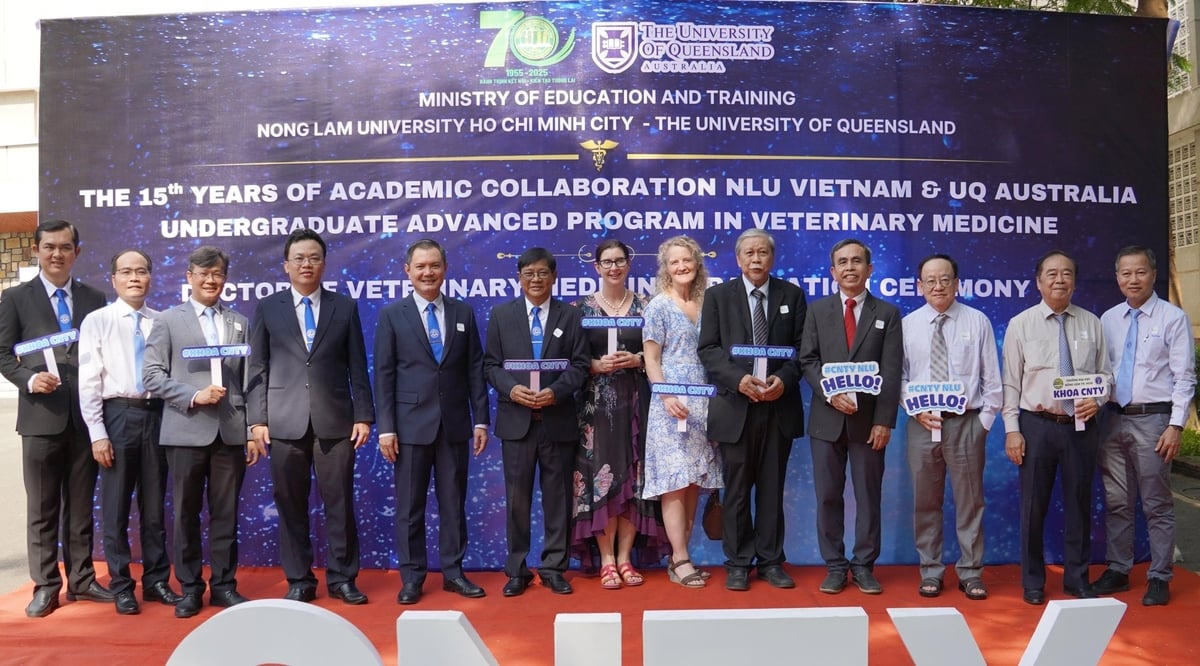December 22, 2025 | 17:04 GMT +7
December 22, 2025 | 17:04 GMT +7
Hotline: 0913.378.918
December 22, 2025 | 17:04 GMT +7
Hotline: 0913.378.918
Vietnam has an abundance of universities training veterinarians, but every year there is still a shortage of human resources. There are still many bottlenecks in the training of veterinary human resources that need to be resolved to meet actual market demands.
Vietnam Agriculture and Nature Newspaper recently had an opportunity to interview Assoc. Prof Le Quang Thong, Head of the Faculty of Animal Science and Veterinary Medicine, Nong Lam University Ho Chi Minh City. Assoc. Prof Le Quang Thong has spent many years working in human resource training and development for the veterinary industry.

Assoc. Prof Le Quang Thong, Head of the Faculty of Animal Science and Veterinary Medicine, Nong Lam University Ho Chi Minh City. Photo: Le Binh.
Dear Assoc. Prof Le Quang Thong, what is your current view on Vietnam’s veterinary human resource training?
Vietnam’s current veterinary human resource training is going against the world trend, especially in comparison to developed countries. Vietnam currently has 22 universities that provide veterinary training, with 3,000 new doctors graduating each year.
Developed countries see the veterinary industry differently. They apply digital technology a lot in animal care. A very large-scale livestock farm only has 1 - 2 veterinarians, not a team of veterinary staff like ours. When a problem arises, we often need a lot of human resources to dissect and solve it, meanwhile, they only need a veterinarian specializing in that field for consultation and to deal with it swiftly.
We have a large number of veterinary graduates in our country, but why does it seem that we still can not meet the actual demands?
There are about 3,000 students and trainees studying veterinary medicine every year. The 10 largest livestock enterprises in Vietnam need to recruit about 3,000 employees to secure operation. We also have nearly 3,000 veterinary clinics nationwide, and this number will continue to grow in the future. If each clinic needs to recruit one more veterinarian or veterinary specialist, it is clear that the supply seems lacking, considering the demands.
After graduation, most veterinary students tend to apply for technical positions at farms or as specialists at veterinary hospitals and clinics. Some of them choose to become sales and marketing staff for companies in the field of livestock farming, feed production and research.

Veterinary students at Nong Lam University Ho Chi Minh City regularly practice surgery on animals. Photo: LB.
Could you elaborate on the trend of veterinary students switching to marketing after graduation? Is this the cause of the shortage of human resources in the veterinary industry?
Considering this is a very specific industry, marketers for businesses in the field of livestock production and veterinary medicine are required to have a deep understanding of physiology, disease status, and the development process of livestock. If they do not have specialized knowledge about animal husbandry and veterinary medicine, it will be very difficult to convince customers when introducing products.
It takes a lot of time, effort and money to train a veterinarian until graduation, and graduates will achieve high efficiency and performance while working in relevant fields thanks to the experience gained through methodical training. However, right after graduation, many people choose the direction of marketing, which is actually a waste.
In your opinion, what should we do so that veterinary students do not have to be "hand-held" or retrained from scratch when they graduate?
Veterinary medicine requires students to not only have a firm grasp of knowledge but also solid practical skills. Due to the large number of students, many universities have not met that requirement. Since there are too many students, the facilities will not be enough. In fact, many schools are teaching “dry”, that is, pure knowledge with very little practice.
There is a huge difference between school training and the real labor market outside. Businesses are progressively applying digital technology, so schools normally cannot keep up. In the case of our Faculty of Animal Science and Veterinary Medicine, we have pioneered the 6-month internship program at businesses since 2022.

Nong Lam University Ho Chi Minh City has recently held a ceremony to summarize 15 years of developing the veterinary training program according to international standards, in collaboration with the University of Queensland (Australia). Photo: Le Binh.
After 6 months, students will have to submit a report and presentation to see if they meet the qualifications. This helps students grasp the requirements of employers right from when they are still in school. This will limit the situation of retraining.
The faculty also invites experts or senior managers from companies to directly teach or participate in dialogues. They can share their vision and convey practical information, sharing good experiences with students. 75% of the conversations would concern professional knowledge, and the remaining 25% would be related to soft skills. For example, skills to write a job application, how to report in front of a crowd, etc.
Every year, the Faculty of Animal Science and Veterinary Medicine sends approximately 30 students to study and gain experience in Australia, Korea, Japan, Taiwan, China, the USA, Thailand, Malaysia, Indonesia, and the Philippines. In return, the faculty also accepts foreign students for internships from the USA, France, Belgium, Indonesia, and many more.

Vietnamese veterinarians also need to take a practice certificate exam and are regulated like human doctors. Photo: LB.
Dear Assoc. Prof Le Quang Thong, what is the future of veterinary human resource training in Vietnam? What do we need to do to keep up with the world and better serve the domestic livestock industry?
In my opinion, the first thing is that the veterinary training program must follow the path of developed countries. Vietnam is the only country in Southeast Asia that still trains veterinarians in a 5-year program, some schools even train for 4.5 years. Meanwhile, it is 7 years in France, and 10 years in the USA. Cambodia, Laos and Myanmar are all using the 6-year program.
Secondly, we need more specialized training. Like treating human diseases, veterinary medicine also needs to be trained in each specialty, such as dermatology, cardiology, orthopedics, obstetrics and gynecology, etc.
Lastly, Vietnam has not yet organized a license exam for veterinarians. The World Organization for Animal Health has mentioned many times that Vietnam must organize these exams. This is a clear measure of the quality of training of schools, making it the standard for veterinarians.
Thank you, sir!
Translated by Samuel Pham

(VAN) The 2025 Joint Response Plan (JRP) identifies three core priorities and calls for $96.2 million to support disaster recovery for 1.4 million people.

(VAN) Risk assessment methodology enables early risk identification, rational resource allocation, and the development of control measures tailored to the food value chain.

(VAN) Once considered a waste product to be burned, rice straw in the Mekong Delta is now being collected and processed through mechanization and biotechnology, paving the way for a sustainable circular agricultural model.

(VAN) Risk assessment in food safety management not only helps protect public health but also promotes sustainable development.

(VAN) Prime Minister chaired the 26th meeting of the National Steering Committee on Illegal, Unreported, and Unregulated (IUU) Fishing.

(VAN) Cuba is currently streamlining procedures to attract investors, with many new policies shaped by the practical experiences of Vietnamese projects operating in the country.

(VAN) Patrol Team No. 15 has been executing patrol, inspection, and control duties in the Southwest waters, a region identified as having a high risk of violations.